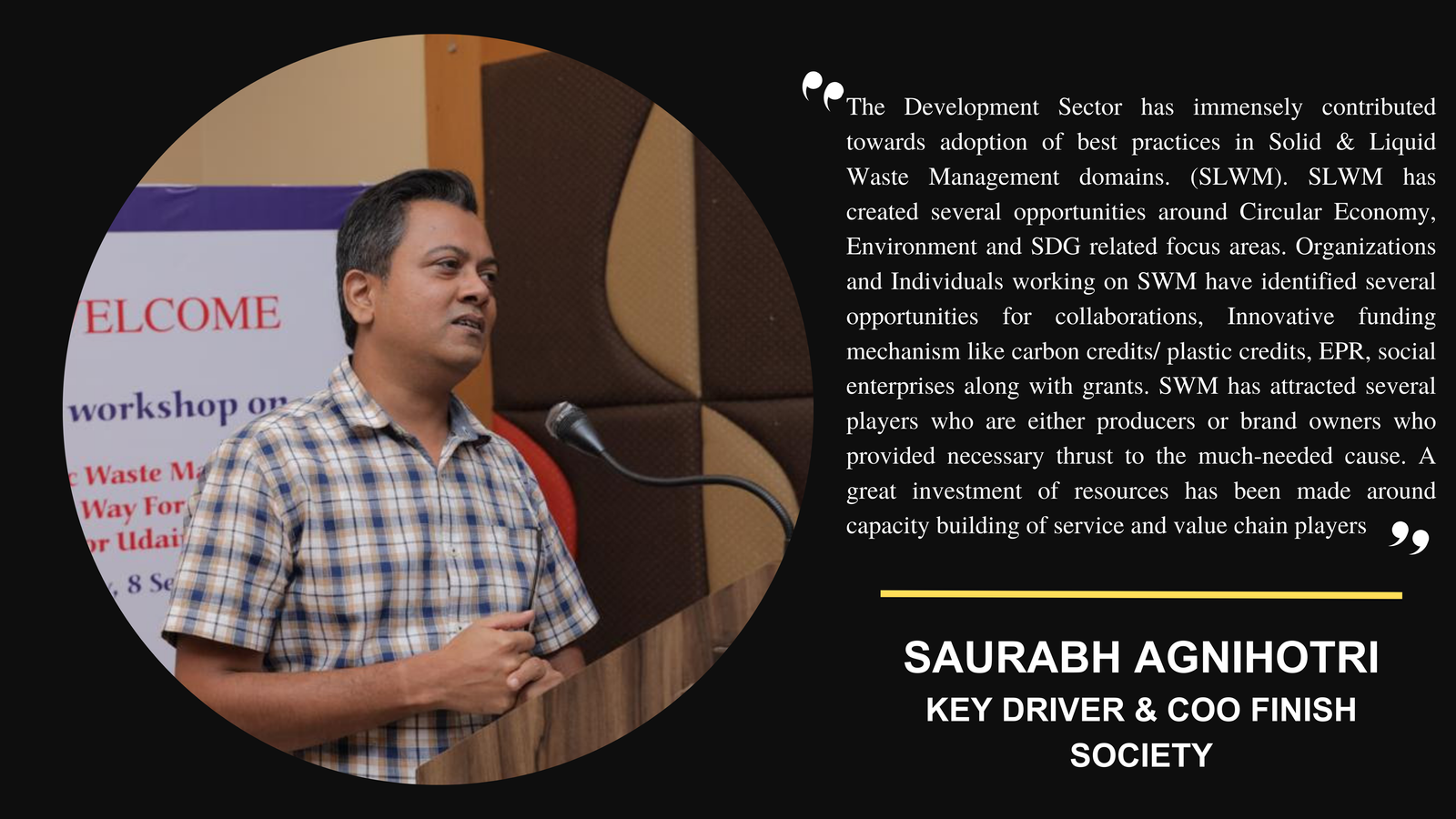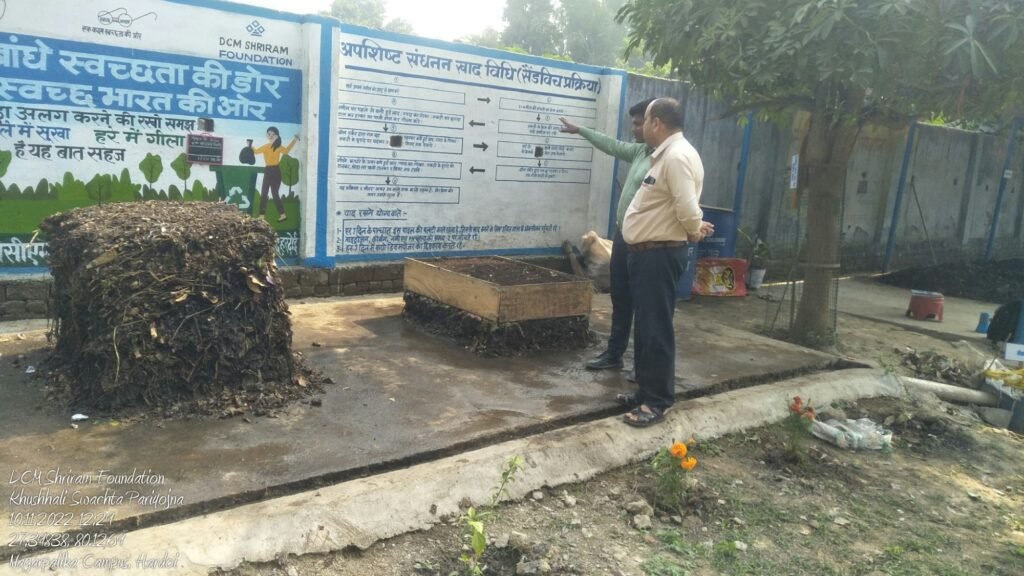
Better The Hygiene Better The Ability To Work Long Hours
The Development Sector has immensely contributed towards the adoption of best practices in Solid & Liquid Waste Management domains. (SLWM). SLWM has created several opportunities around Circular Economy, Environment and SDG-related focus areas. Organizations and Individuals working on SWM have identified several opportunities for collaboration, Innovative funding mechanism like carbon credits/ plastic credits, EPR, social enterprises along with grants. SWM has attracted several players who are either producers or brand owners who provided necessary thrust to the much-needed cause. A great investment of resources has been made around capacity building of service and value chain players” says key driver and COO FINISH Society, Saurabh Agnihotri. Here are examples from his freewheeling exclusive interview given to T.O.P. media advisor Chander Mahadev

Q1- Having made a paradigm shift from the corporate world to the development sector over a decade ago, can you trace the challenges you faced and how you overcame them?
To begin with, we never approached any challenge with a “Particular Sector Approach. Being from a Corporate background we unlearn and learn at a brisk pace with a “goal at the center”. The Challenge was acceptability by stakeholders, the complexity of the idea of FINISH, engagement with a multitude of stakeholders (government, banks, financial institutions) and attracting talented minds and Individuals.
Q2-What makes you so passionate about your work and what are the three factors that keep you going?
Sanitation is the most crucial Intervention and its effect on life, mortality, dignity are unparalleled. Every Rupee Invested in terms of time and Money will Evolve as Outcome more than 4 times. Improved hygiene impacts health, and affects the ability to work for longer durations. Economics aside, it can be factored with cleanliness and its effect on real estate prices in the neighborhood, confidence level of businesses as it triggers enthusiasm all around. People and businesses wanted to shift to cleaner localities and It can’t be achieved without Sanitation for All!
Q3- In the past decade and more, how have you seen the safe sanitation and hygiene sector evolve? What role has Swachh Bharat Mission (SBM) played in changing the situation on Ground Zero with regard to ODF and ODF+?
SBM has been successful on more than one count (beyond Toilets). It has created confidence and installed known how in government functionaries to mobilize resources and achieve far-reaching time bound results. It has created a pool of trained individuals in rural and urban areas, focused attention towards gaps, motivated entrepreneurs and academicians which are still busy continuing to find Solutions to plug gaps. The sanitation sector got tremendous fillip in the last decade thanks to attention and Focus given by governments across the board. More and more talented young minds have joined this Revolution, applications (apps) were made, training modules were developed, loans and funding got diverted towards rural economy. On an average each toilet constructed has created at least 10 days of direct and 10 days of indirect livelihood and income generation opportunities.
Q4- How important are Behavior change and IEC tools in bringing about change at the grassroots?
BCC and IEC are the basis of movements like SBM to have successfully survived. Since the program targeted the age-old practices of Open Defecation, littering, dumping, and spitting, it needed collaborations from various angles. Only a well-crafted, flexible yet focused approach could have achieved the same and that was only possible thanks to BCC Campaigns, approaches like CLTS. CATS, participatory learning and ever evolving communication tools, video shows, films, skits etc.A scheme of things which appealed equally to the elderly, the young, male/female in equal measure was developed though a well-designed and ever-absorbing mechanism of “feedbacks”. Further, Interview, responses and research studies paved the ways for communication content and methods. Social media platforms also played a crucial role in this regard.
Q5- How have financial inclusion, sanitation bonds and the MFI sector contributed to meeting our goals of a circular economy?
MFI/sanitation Instruments have helped beneficiaries in working a sanitation facility, water closet, bathroom etc. Financial engineering such as these have made decision making faster and easier for the beneficiary. It has also helped in bringing costs down as economies of scale have tilted the level in favor of collective buying (MFI/ Groups/ SHGs).
Q6- Considering you are a very young sanitation expert in the field do you face any special problems from stakeholders, direct or indirect? Kindly share some interesting and humorous examples
I recall a particular instance of toilet pit digging where there was a fight between Daughter-in-law and mother in-law and the toilet was having 2 doors as both of them didn’t want to use the door the other used. There are also instances where a beneficiary was using live radio in place of a broken door to make people aware that the toilet was in use.
Q7- Can you share with your audience as to the changes you have witnessed in the development sector with special reference to SLWM?
The development Sector has immensely contributed towards adoption of best practices in SLWM. SLWM has created several opportunities around circular economy, environment and SDG related focus areas. Organizations and Individuals working on SWM have identified several opportunities for collaborations, Innovative funding mechanism like carbon credit/ plastic credits, EPR, Social enterprises along with Grants. SWM has attracted several players who are either producers or brand owners and provided necessary thrust to the much-needed cause. A great investment of resources has been made around capacity building of service and value chain players.
Q8- Being based in Udaipur, can you share some peculiar and interesting challenges you have faced in the past 12-13 years?
One of the most difficult challenge in the sector is to address “perceived political populism”. In this new age more and more individuals are appreciating cleaner air, and better surroundings but still more effort is needed to be made by policy makers in general to bring this in central focus and implement by-laws in more long term and proficient ways. Long term planning is getting widely hampered because of same.
Q9- Can you share your insights on how working in the WASH sector ushered in changes in the Indian eco system?
The WASH Sector has ramifications on water, soil, air and flora/ fauna. It has brought the attention of general public around environment and eco systems. Young children are challenging practices of the elderly (there are several examples and stories that reflect this), Schools are adopting curriculum, courses around sanitation. Tourist are appreciating “sustainable hotels/resorts “Recycling is picking up faster pace than ever before.

Q10- Can you quantify the role played by CSR partners in our social interventions and how they have approached safe sanitation and hygiene in a pan-Indian context?
Several Corporates like ITC, DCM, PwC India Foundation, LIC Housing Finance and UN Bodies like UNICEF/ UNDP who have done great work are not only helping NGOs but going beyond CSR obligations and are invested in capacities and social sector organizations, service providers and SHGs. Corporate houses have brought business acumen to social enterprises working in the space of sanitation. Managers and employees in effect started doing volunteering sessions and bring desired element of ownership and enthusiasm. Several efforts have been made by CSR Donors to engage with a wider network of employees in their companies.

